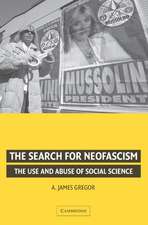Reparations for Nazi Victims in Postwar Europe
Autor Regula Ludien Limba Engleză Hardback – 26 aug 2012
Preț: 695.06 lei
Preț vechi: 780.97 lei
-11% Nou
Puncte Express: 1043
Preț estimativ în valută:
133.00€ • 139.15$ • 110.48£
133.00€ • 139.15$ • 110.48£
Carte tipărită la comandă
Livrare economică 02-16 aprilie
Preluare comenzi: 021 569.72.76
Specificații
ISBN-13: 9781107023970
ISBN-10: 1107023971
Pagini: 282
Dimensiuni: 166 x 242 x 26 mm
Greutate: 0.54 kg
Ediția:New.
Editura: Cambridge University Press
Colecția Cambridge University Press
Locul publicării:New York, United States
ISBN-10: 1107023971
Pagini: 282
Dimensiuni: 166 x 242 x 26 mm
Greutate: 0.54 kg
Ediția:New.
Editura: Cambridge University Press
Colecția Cambridge University Press
Locul publicării:New York, United States
Cuprins
1. Introduction; 2. War's end and blueprints for a new world order; 3. France: the dialectics of suffering and sacrifice; 4. Germany: Hitler's many victims and the survivors of Nazi persecution; 5. Switzerland: neutralizing the past; Conclusion: 6. Talking about victimization: a European model.
Recenzii
'Reparations for Nazi Victims in Postwar Europe is an exceptionally thorough analysis of reparation and compensation policies on behalf of victims of Nazism in Western Europe between 1945 and 1960. Based on extraordinary research, the book traces the roots of our contemporary reparation and indemnification regime and unveils the birth of a new paradigm in international morality. Ludi offers a magisterial analysis of crucial policy debates pertaining to collective memory and guilt, visions of justice, and the reaffirmation of state legitimacy through the reintegration (and exclusion) of various categories of victims.' G. Daniel Cohen, Rice University
'In comparing the well-known German case with the less-well-known cases of France and Switzerland, Regula Ludi convincingly argues that the emergence of the concept of reparations after World War II must not be reduced to the history of 'Wiedergutmachung'. Her book shows how the search for redress for Nazi victims resulted in the stunning evolution of the survivor as a dominant social figure of today's world.' Norbert Frei, University of Jena
'Since the end of the Second World War, and particularly in recent decades, the world has seen increasing calls for the rectification of historic wrongs to individuals, people who were previously neglected and even disparaged in postconflict societies. Regula Ludi's splendid investigation of how this commitment emerged in the post-Nazi era is quite simply the best work we have on this important subject. Hers is a sophisticated, penetrating study that will define our understanding of this transformation for years to come.' Michael R. Marrus, Chancellor Rose and Ray Wolfe Professor Emeritus of Holocaust Studies, University of Toronto
'An impressive study that rearranges existing literature in a thought-provoking manner and that also offers numerous new empirical insights. In many respects, this book is highly stimulating … Ludi has opened new paths into a complicated historical process, and she has proved that it will be worthwhile to go further.' H-Review Digest
'Ludi's work raises some significant questions on how post-war European states dealt with the aftermath of the Second World War.' Christian Goeschel, Journal of Continuity and Change
'In comparing the well-known German case with the less-well-known cases of France and Switzerland, Regula Ludi convincingly argues that the emergence of the concept of reparations after World War II must not be reduced to the history of 'Wiedergutmachung'. Her book shows how the search for redress for Nazi victims resulted in the stunning evolution of the survivor as a dominant social figure of today's world.' Norbert Frei, University of Jena
'Since the end of the Second World War, and particularly in recent decades, the world has seen increasing calls for the rectification of historic wrongs to individuals, people who were previously neglected and even disparaged in postconflict societies. Regula Ludi's splendid investigation of how this commitment emerged in the post-Nazi era is quite simply the best work we have on this important subject. Hers is a sophisticated, penetrating study that will define our understanding of this transformation for years to come.' Michael R. Marrus, Chancellor Rose and Ray Wolfe Professor Emeritus of Holocaust Studies, University of Toronto
'An impressive study that rearranges existing literature in a thought-provoking manner and that also offers numerous new empirical insights. In many respects, this book is highly stimulating … Ludi has opened new paths into a complicated historical process, and she has proved that it will be worthwhile to go further.' H-Review Digest
'Ludi's work raises some significant questions on how post-war European states dealt with the aftermath of the Second World War.' Christian Goeschel, Journal of Continuity and Change
Notă biografică
Descriere
A history of reparations from a comparative and transnational perspective, tracing back to their origins in the final years of the Second World War.















